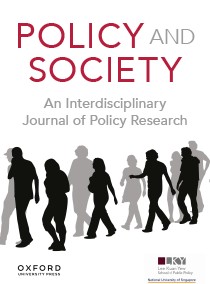弥合“同意差距”:跨境大型项目的合法化机制
IF 6.1
1区 社会学
Q1 POLITICAL SCIENCE
引用次数: 2
摘要
在最近关于大型项目(MPs)的辩论中,更多的注意力集中在组织间和多参与者网络的功能上,这是近年来最具创新性的特征之一。这些结构的复杂性给国会议员的管理带来了可治理性问题。相互承认和同意成为能够开创更多协作过程和实践的要素,以减少国会议员在组织和管理方面的批评。本文关注的是一个被忽视的关系维度,即合法性。我们认为,合法性是将有效性和行动能力赋予相关组织的核心维度。合法性规范了各种组织之间的关系,尤其是组织与公共领域之间的关系。制度主义理论认为,合法性在社会进程的构建中起着核心作用,并将其定义为社会对一个行动者、一个想法或一个项目的普遍接受形式。在本文中,我们假设,由利益相关者赋予和“持有”的合法性是应对国会议员三个关键方面的关键因素,即不确定性、复杂性和冲突,这些因素影响着公众共识的构建和参与的利益相关者之间关系的质量。我们通过分析德国和丹麦之间的跨境固定链接(Fehmarnbelt Fixed Link)来验证我们的假设。本文集中讨论了利益相关者利用埃里克森话语合法化方案获得合法性的机制。这些机制(循证机制、公众参与机制和立法者指挥机制)不同,在增加或遏制这三个关键方面产生不同的结果。本文章由计算机程序翻译,如有差异,请以英文原文为准。
Bridging the “consent gap”: mechanisms of legitimization in a cross-border megaproject
In the recent debate on megaprojects (MPs), greater attention is devoted to the functioning of the interorganizational and multiactor networks that are one of the most innovative features in recent years. The complexity of these structures brings out governability issues for an MP’s management. Mutual recognition and consent become elements capable of inaugurating more collaborative processes and practices to reduce organizational and management criticalities in MPs. This paper focuses on a neglected relational dimension, namely legitimacy. We argue that legitimacy is instead the central dimension that attributes effectiveness and capacity for action to the organizations involved. Legitimacy regulates the relationship between various organizations—and especially—between organizations and the public sphere. Institutionalist theory assigns a central role to legitimacy in the construction of social processes, defining it as a generalized form of social acceptance toward an actor, an idea, or a project. In this paper, we hypothesize that the legitimacy attributed and “held” by the stakeholders is a crucial element in countering three critical aspects of MPs, namely the uncertainty, complexity, and conflict acting on the construction of public consensus and the quality of relationships between the participating stakeholders. We verify our hypothesis by analyzing a cross-border MP, the Fehmarnbelt Fixed Link between Germany and Denmark. The paper concentrates on the mechanisms with which stakeholders can acquire legitimacy using the Eriksen discursive legitimation scheme. These mechanisms are different (evidence-based, public participation, and legislators’ command) and produce different outcomes in terms of increasing or containing these three criticalities.
求助全文
通过发布文献求助,成功后即可免费获取论文全文。
去求助
来源期刊

Policy and Society
Multiple-
CiteScore
18.00
自引率
6.50%
发文量
43
审稿时长
30 weeks
期刊介绍:
Policy and Society is a prominent international open-access journal publishing peer-reviewed research on critical issues in policy theory and practice across local, national, and international levels. The journal seeks to comprehend the origin, functioning, and implications of policies within broader political, social, and economic contexts. It publishes themed issues regularly and, starting in 2023, will also feature non-themed individual submissions.
 求助内容:
求助内容: 应助结果提醒方式:
应助结果提醒方式:


